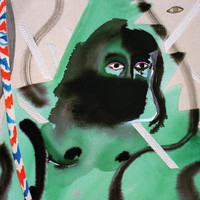
Jennifer Castle
Castlemusic
(Flemish Eye; 2011)
By Scott Reid | 2 August 2011
Late on Castlemusic, the first record Toronto folk singer-songwriter Jennifer Castle has released under her own name, we get the closest these nine songs get to a lucid, connective thread: “All I have to do today is get past remembering.” Castle asserts this not as some daily minutiae—as if her to-do list has only three items: 1) Wake up; 2) Remember something!; 3) Sleep—but as a perpetual hurdle to overcome as she tries to focus on the simple whims of what she describes as a quiet, hippie-ish life: drying cedar leaves, picking sage, and, um, tattooing herself. This theme of struggling to let go of the past pervades each of these songs—as does finding comfort outside of oneself, embracing a pantheistic-like view of nature and the cosmos as a way of putting things into perspective and coping with all that consuming personal shit. If this already sounds like the sort of thing for which your patience is tenuous at best, I should probably warn you up front: at one point during this record you’ll hear Castle describe clouds as raining down “a cosmic brew.” Please, don’t let this detour you.
It’s not hard to suss out the sense of longing or desperation she’s getting at in these songs, but if a lyric like “I’m talking to you / There isn’t anyone to pull the hair back from the face of the moon” still seems more than a little vague, well, in the context of this record and its packaging (see: Mira Dancy’s surreal artwork, Castle’s contrasted-as-fuck photocopied picture on the back cover, the oblique imagery that her own press kit likens to “a half-remembered dream”), it’s par for Castlemusic’s course as a record that’s more poetically suggestive of its themes than it is able to forcefully wield them. Opener “Summer” is a perfect example of this, tinges of feedback and shimmering electric guitar nuzzling in the background as Castle waxes nostalgic about someone from her past (“Lost him down to the dead of summer / And in the dead of summer / I love you forever”). It’s haunting stuff, but, again, there’s only a fleeting sense of what’s being communicated in all this recurring imagery (setting suns, eclipsed moons, seasons, flowers, loss, poverty, booze), or in a line like “I remember the summer of bread / The summer of sky, the summer of night / Half moon you’re an omen / You’re ahead.”
The good news is that it’s easy to not hold any of this against Castlemusic. Musically, these are consistently beautiful, easy-to-grasp songs. Castle deals exclusively in minimal psych-folk ballads, and she wisely avoids verse-chorus structures in favour of more natural progressions, of subtlely powerful convergences of each song’s few elements. Primarily, this means putting focus on her voice, which stands, stark and of varying warble, at the heart of these songs, unambiguously affecting even when the words she’s singing aren’t. For instance, the excellent, early Devendra Banheart-esque “Neverride” peaks with Castle’s voice, split between a low hum and soaring higher register, softly layering upon itself in a chilling melody that quickly floats off into Stew Crookes’ pedal steel. Likewise, the Harvest (1972)-era Neil Young feel of “Way of the Crow” culminates with a gorgeous one-off harmony as the penultimate verse comes to a close, sounding as if the entire song was written to birth those few tremendous seconds.
There’s little in the way of tempo changes, and while her barely-there accompaniment—some pedal steel and upright bass here, some flute and vibraphone there—is varied enough to keep things interesting, especially if you’re listening on a good set of headphones, it never comes close to weighing down the echoey, spacious production. There’s almost a complete lack of percussion, so when the slow thump of a bass drum and tambourine rattle enters on “Powers”—its mouthful of a hook, “There’s new colours / Peach, lavender, emerald, alizeran, and black,” one of the album’s catchiest—it’s just enough to infuse some much-needed momentum, able to ever-so-slightly break up the sameyness of it all, even though a) beyond the percussion it pretty much sounds the same as the rest of these songs, and b) calling it mid-tempo would be generous.
There really aren’t any bad or outright boring songs here, though Castlemusic’s very best moments are largely front-loaded. Despite changing up lead instruments in the second half, things begin to really blur together once “You Don’t Have to Be” shuffles in with a melody that eerily recalls fellow Canadian singer-songwriter Sarah Harmer. Though it and the two equally slow burners it precedes can, on their own, be further examples of Castle’s considerable skill with minimal folk (the piano-led “Remembering” especially), together they start to drag a little too much. Thankfully the unexpected triumph of “Poor as Him” follows as the closest this record gets to rocking out, with a steady backbeat, tremolo-drenched electric guitar, and Castle’s voice stretching beyond her usual lax country-folk delivery. It’s a much-needed change of pace, and a fantastic way to end the record.
Well, almost. After having spent eight straight songs working through sorta vague but unmistakably gloomy issues, Castle finally steps back on “The Friend,” a short epilogue consisting of just a fingerpicked acoustic guitar. Again, instead of sticking to the sort of verse-chorus structure that plagues so much folk, each riff curiously stumbles forth as if almost entirely improvised, making for a gripping closer even despite its surprising lack of vocals. And, along with “Poor as Him,” it gives us good reason to be optimistic that Castle will continue to move toward the unexpected, beyond this record’s (yes, extremely pleasant) comfort zone—musically pushing forward even if lyrically she’s never able to finally get past remembering.





